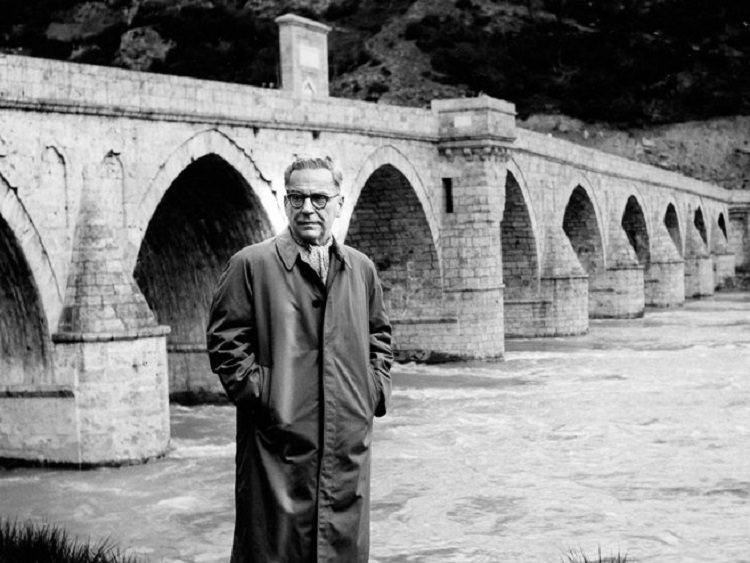
Serbian writer and Nobel laureate Ivo Andrić died on this day
The great Serbian writer and Nobel laureate Ivo Andrić died on this day, leaving behind a great literary work.
In Andrić's life, literary and successful diplomatic phases alternated.
Andrić, born in Dolac on October 9, 1892, and died in Belgrade on March 13, 1975, was a Serbian and Yugoslav writer and diplomat of the Kingdom of Yugoslavia.
In 1961, he was awarded the Nobel Prize in Literature "for the epic power with which he shaped the themes and portrayed the destinies of people throughout the history of his country."
In his youth, Andrić was a member of the progressive Young Bosnia movement and a passionate fighter for the liberation of the South Slavic peoples from the Austro-Hungarian monarchy.
He graduated and received his doctorate in Graz, Austria, and spent the time between the two world wars serving in the consulates and embassies of the Kingdom of Yugoslavia in Rome, Bucharest, Graz, Paris, Madrid, Brussels, Geneva and Berlin.
He was a member of the Serbian Academy of Sciences and Arts. His most famous works are "On the Drina bridge", "Travnička hronika", "Kreleta avlija", "The lady" and "Jelena, the missing woman", then a series of exciting short stories, poetic writings...
In his works, he mainly dealt with describing life in Bosnia during the Ottoman rule.
There is an Ivo Andrić Endowment in Belgrade, and the first and most important provision of the writer's will was to preserve his legacy as a whole and to use it as a legacy or an endowment for general cultural and humanitarian needs.
Based on the writer's will, the Andrić Prize is awarded every year for a story or collection of stories written in the Serbian language.
During the German occupation of Serbia and Yugoslavia, Andrić refused to receive a pension and insisted that his actions not be publicized.
He refused to sign the "Appeal to the Serbian People" which "condemns resistance to the occupier".
For moral reasons, he refused the invitation of cultural workers to include his short stories in the "Anthology of Contemporary Serbian Short Stories" during the time when "the people are suffering and suffering":
- As a Serbian storyteller, as a long-time associate of the Serbian Literary Association and a member of its former Literary Committee, I would understandably respond to this call under normal circumstances.
It is not possible for me today, because in the current exceptional circumstances, I do not want and cannot participate in any publications, neither with new ones, nor with my previously published works - explained Andrić.
In the silence of a rented room in Prizrenska Street, he wrote "The Grass Chronicle", and at the end of 1944, the novel "On the Drina Bridge". He published both novels in Belgrade a few months after the end of the war.
Andrić was buried in the Alley of Meritorious Citizens at Belgrade's New Cemetery.
The Ivo Andrić Endowment also includes the Memorial Museum, which is part of the Museum of the City of Belgrade and was opened in 1976 in the apartment at Andrićevo venac 8, where the writer lived with his wife Milica Babić since 1958.
On the initiative of the great Serbian and international filmmaker Emir Kusturica, Andrićgrad or Kamengrad was built in Višegrad - a cultural center located in the Ušće location at the very confluence of the Drina and Rzav rivers, and was opened on July 5, 2012.
The city is built of stone and there are about fifty buildings in it - a theater, a modern cinema, the city administration, an academy of fine arts, a river marina and a pier, hotels, squares, a church, an old inn, shops and a memorial house of Ivo Andrić...
Ivo Andrić declared himself directly and unequivocally as a Serb and a Serbian writer.
In his letter to the Commissioner of the Serbian Literary Cooperative /1942/, he points out that he is a Serbian writer. In his personal documents, identity card /1951/, military booklet /1951/, party booklet /1954/, extracts from birth and marriage registers, he wrote "Serbian" in the "nationality" column.
Andrić twice refused to have his poems included in the "Anthology of Croatian Lyrics", and in 1954 he refused to mention that he was of Croatian origin in his biography in the Yugoslav Encyclopedia.
As a kind of confirmation of Iva's ethnicity, Canadian-American historian William McNeil writes that Iva's mother's parents were Serbs, and Vojnović's letter to his brother Luja in which he says:
- I am sending the work ``Ex Ponto'' which caused a great sensation. Writer, young Catholic Serb from Bosnia, ideal young man, 26 years old.
Source: Katera
PHOTOS
RELATED ARTICLES
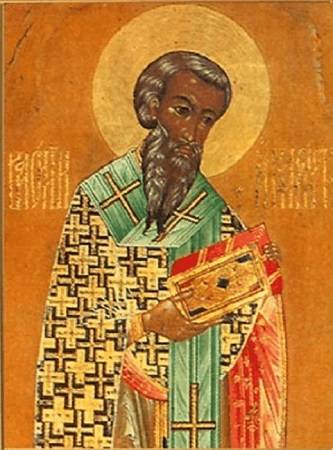
Calendar for May 9 His Homilist Basil of Amasia
Licinius, the son-in-law of Emperor Constantine, whose sister he had married,...
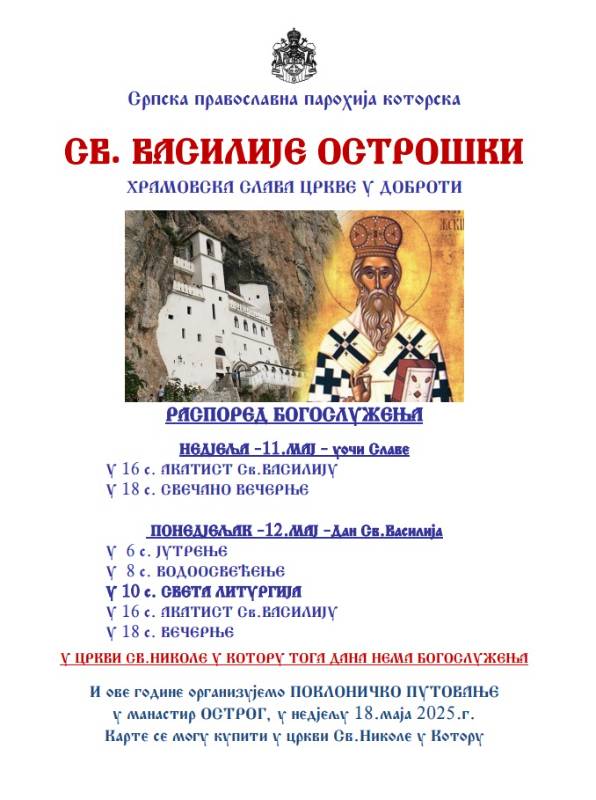
WORSHIPS ON THE OCCASION OF ST. VASILIJE OSTROŠKI
SERBIAN ORTHODOX PARISH OF KOTOR ANNOUNCES WORSHIPS ON THE OCCASION OF ST....

St. Mark's Day procession in Podgorica
On the occasion of the celebration of the city of Podgorica, the...


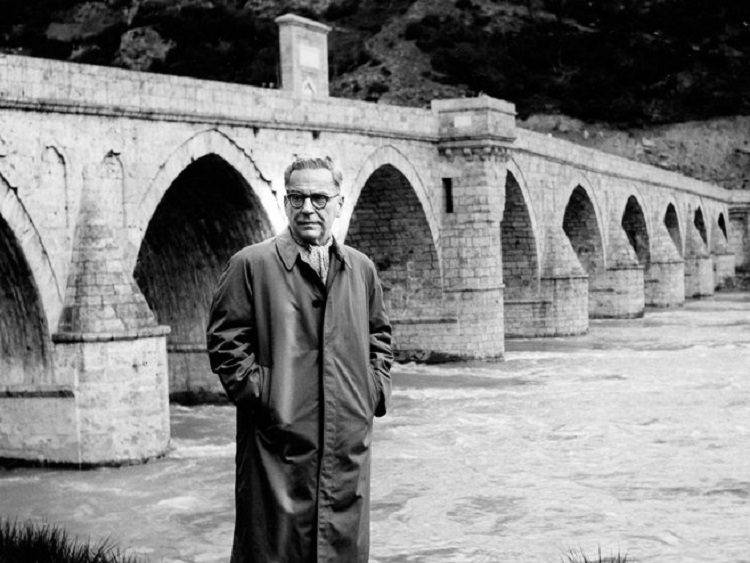

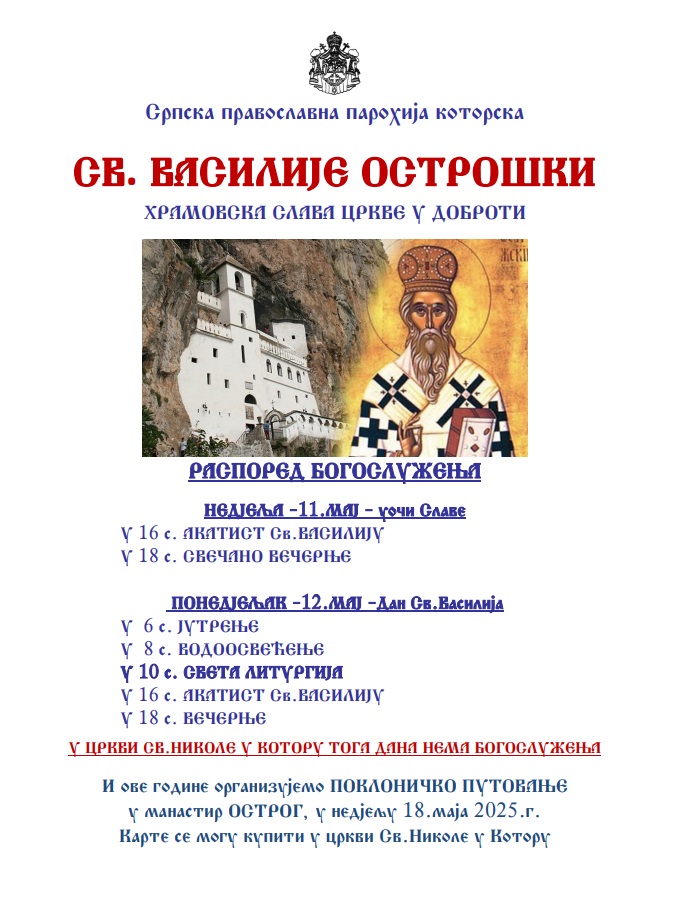
.png)